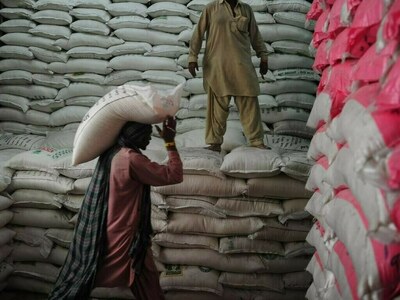Sugar Import Decision: Impact and Controversy
The government’s choice to import 0.5 million tons of sugar is projected to elevate the import expenditure by $275-280 million. This includes 300,000 tons procured through the Trading Corporation of Pakistan (TCP) and the remaining 200,000 tons obtained via the private sector. However, this action is unlikely to decrease prices promptly.
An informal survey indicated that the government’s import strategy will likely only maintain sugar prices at the prevailing Rs 195-200 per kg level, rather than lower them, given a projected landed cost of Rs 155 per kg.
Muzzammil R Chappal, Chairman of the Cereal Association of Pakistan, observed that international sugar prices have remained consistent for the past 8-9 months, fluctuating between $560-565 per metric ton. The government will primarily encounter expenses through tax exemptions.
Tax Exemptions on Sugar Import
The Federal Board of Revenue (FBR) has eliminated customs duties on importing 500,000 metric tons of sugar, reduced the sales tax rate from 18 percent to 0.25 percent, and set the withholding tax at 0.25 percent for sugar imports by both the TCP and the private sector. Additionally, the FBR has waived the 3 percent minimum value-added tax (VAT) on sugar imports.
During a recent Economic Coordination Committee meeting, the Finance Secretary initially opposed waiving taxes or providing subsidies. However, reports indicate that the government bypassed the ECC, securing direct approval from the federal cabinet.
A source within the Ministry of Finance stated that the budget lacks provisions for this transaction, and the Secretary of Finance informed the Cabinet that the decision necessitates informing IMF staff due to substantial tax exemptions and foreign exchange implications, given the existing IMF program.
Deputy Prime Minister Ishaq Dar reportedly overruled the Ministry of Finance’s stance during a Cabinet meeting. The Cabinet subsequently reviewed and approved the summary from the Ministry of National Food Security without detailed discussion, utilizing a procedural allowance for circulating summaries.
CCP’s Concerns and Historical Context
The Competition Commission of Pakistan (CCP) has voiced significant concerns regarding the government’s planning and handling of essential goods. They highlighted that on October 11, 2024, the ECC authorized the export of 500,000 tons of “surplus” sugar, which the Federal Cabinet ratified, subject to conditions including mandatory production commencement by November 21 and a 90-day export window.
Consequently, sugar exports occurred between November 2024 and January 2025, with retail prices ranging from Rs 150 to Rs 165 per kilogram. The Ministry of Commerce had previously expressed apprehensions that permitting sugar exports would significantly inflate prices.
Domestic prices have steadily increased, reaching approximately Rs 200 per kg recently. This surge has provoked public discontent, with accusations of government mismanagement. Critics argue that exporting sugar created an artificial domestic shortage, leading to increased prices and the need for costly imports.
The CCP referenced its August 2021 order, which cautioned against policy cycles driven by industry influence. This order scrutinized the actions of the Pakistan Sugar Mills Association (PSMA) and its members, investigating potential collusive practices affecting export decisions and domestic pricing.
The investigation revealed a concerning trend in Sugar Advisory Board (SAB) meetings, where PSMA representatives advocated for exports, even during active crushing seasons. A 2012 example showed PSMA warning of reduced profitability from delayed export decisions due to international competition, despite ample domestic supply and falling prices.
The CCP’s findings suggested that export permissions, though officially government-sanctioned, were often industry-lobbied under the guise of ensuring farmer payments and surplus stock clearance. There was limited evidence supporting claims that exports did not affect local supply or prices. Retail prices remained elevated even during export-free periods, suggesting market manipulation.
The Commission also determined that the sugar market’s pricing structure lacks transparency, with discrepancies between ex-mill and retail prices. They criticized the government for relying on industry data without independent verification, highlighting a vulnerability enabling cartel-like behavior and flawed policy decisions.
PSMA’s Response
Former PSMA chairman Iskander Khan stated that the PSMA had no involvement in the government’s sugar import decision. He asserted that sugar mills are adequately stocked to meet industrial and domestic demands. He added that they possess approximately 0.5 million metric tons, sufficient for the next 3-4 months, and anticipates surplus sugar upon sugarcane crushing commencement in November.
“The sugar industry requires no subsidies or favors, only adherence to global best practices for smooth and professional operations.”



Comments (0)
No comments yet. Be the first to comment!
Leave a Comment